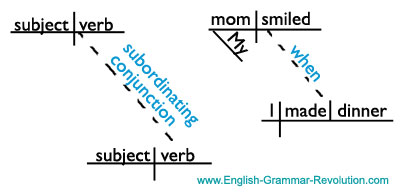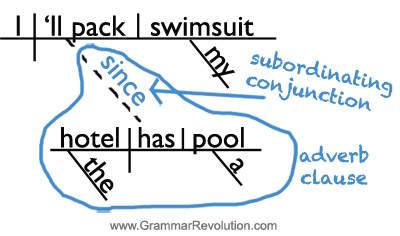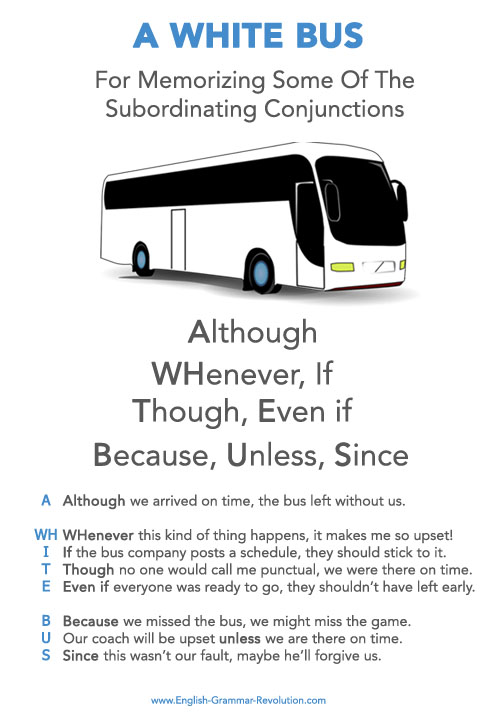Download your free grammar guide here.
Download your free grammar guide here.
Subordinating Conjunctions & A Memory Trick
Subordinating Conjunctions & A Memory Trick
- Home
- Parts of Speech
- Conjunctions
- Subordinating Conjunctions
Have you heard of this trick for
memorizing some of the subordinating conjunctions?
I hadn't heard of it until a friend told me about it recently. I'll show you how it works! But first, let's have a quick refresher on what subordinating conjunctions are.
Psst! Be sure to download and print the free PDF below. It shows you how the memory trick works.
What are subordinating conjunctions?
Do you remember what clauses are? Clauses are groups of words that have both a subject and a verb. There are two main types of clauses: independent clauses and dependent clauses.
Independent clauses are clauses that can stand alone as a complete thought.
My mom smiled
Do you see how my mom smiled is an independent clause? It has a subject (mom), it has a verb (smiled), and it can stand alone as a complete thought.
Dependent clauses are clauses that can't stand alone as a complete thought.
When I made dinner
Do you see how when I made dinner is a dependent clause? It has a subject (I), it has a verb (made), and it can't stand alone as a complete thought. If you walked up to someone and said, "When I made dinner." They would probably follow up with a curious look and a question like, "What happened when you made dinner?" That's because when I made dinner is not a complete thought.
So, what do we do with dependent clauses in order for them to make sense? We connect them to independent clauses!
My mom smiled when I made dinner.
My mom smiled = independent clause
when I made dinner = dependent adverb clause
when = subordinating conjunction
Subordinating conjunctions are special kinds of words that join certain kinds of dependent clauses (dependent adverb clauses) to independent clauses. Note that they are also the words that subordinate the clause in the first place. The words I made dinner create an independent clause, but as soon as we tack on the when, it becomes a dependent clause. Crazy!
Looking at this sentence diagram will help you understand what these conjunctions do. Notice how it connects the dependent adverb clause to the independent clause.

You can learn more about diagramming subordinating conjunctions here.
There are many words that can function as subordinating conjunctions.
The Memory Trick: A WHITE BUS
It's time to check out A WHITE BUS! Remember that there are many subordinating conjunctions, and this mnemonic only helps you remember a handful of them. Here's my version along with nine sentences.
A WHITE BUS
Although
WHenever
If
Though
Even if
Because
Unless
Since
Although we arrived on time, the bus left without us. WHenever this kind of thing happens, it makes me so upset! If the bus company posts a schedule, they should stick to it. Though no one would call me punctual, we were there on time. Even if everyone was ready to go, they shouldn't have left early. Because we missed the bus, we might miss the game. Our coach will be upset unless we're there on time. Since this wasn't our fault, maybe he'll forgive us.
WARNING: These Words Aren't Always Subordinating Conjunctions!
Did you know that most words can function as multiple parts of speech? It's true, and these words are no exception.
Some of the words in A WHITE BUS can function as adverbs or prepositions
as well as subordinating conjunctions. That's one reason that I have example sentences for all of them. In the example sentences, the words are all acting as subordinating conjunctions.
Let's look at the word since for an example. Check out these two sentences.
1. I'll pack my swimsuit since the hotel has a pool.
2. Fred and Ginger have been dancing on the dance floor since last night.
Do you know which since is a subordinating conjunction? In the first sentence, since is followed by a subject (hotel) and a verb (has). This tells us that it's introducing a clause. That's right, folks. Since is a subordinating conjunction in the first sentence.

I'll pack my swimsuit since the hotel has a pool.
I'll pack my swimsuit = independent clause
since the hotel has a pool = dependent adverb clause
since = subordinating conjunction
In the second sentence, since isn't followed by a subject and verb. It's followed by the words last and night. This tips us off that it's not introducing a clause. In this sentence, since is a preposition.

Fred and Ginger have been dancing on the dance floor since last night.
since last night = prepositional phrase
since = preposition
Just remember that you can't find words from this list out in the wild and assume that they are subordinating conjunctions.
You must use that powerful brain of yours to figure it out.
Memorizing lists and examples can be helpful, but don't lose sight of our goal: understanding how words work together.
If you'd like to teach or learn grammar the easy way—with sentence diagrams—check out our Get Smart Grammar Program.
It starts from the very beginning and teaches you grammar and sentence diagramming in easy, bite-size lessons.

Hello! I'm Elizabeth O'Brien, and my goal is to get you jazzed about grammar.
This is original content from https://www.english-grammar-revolution.com/subordinating-conjunction.html
Our Free Guide Gives You A Fun Way
To Teach And Learn The Basics v

Elizabeth O'Brien is the creator of Grammar Revolution.
Her lessons are guaranteed to give you more confidence in your communication skills and make you smile. :)


